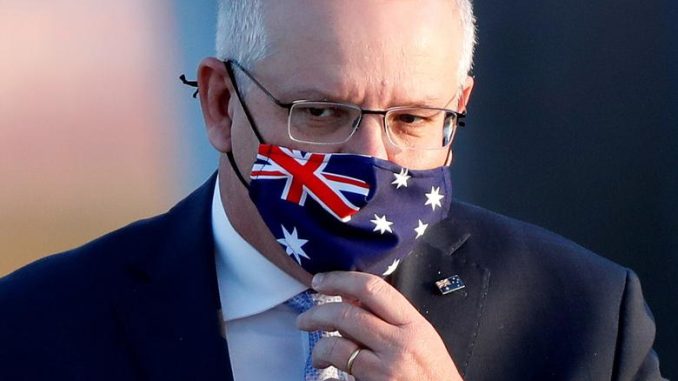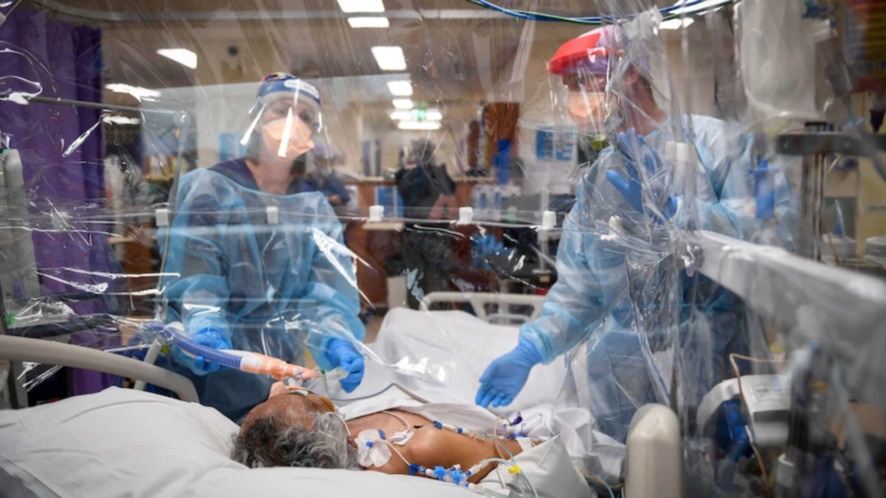
Health ministers of Australian states have demanded “crisis funding” for hospitals ahead of the plan to eased COVID-19 restrictions and open the country for business and international travels.
Key points:
- State and Territory health ministers have written to the federal government calling for additional hospital funding
- The states fear their hospitals will not cope as COVID-19 restrictions are eased
- The federal government has criticised the call as playing politics
State and territory health ministers are asking for “crisis funding” for hospitals as Australia prepares to ease COVID-19 restrictions.
In a joint letter to federal Health Minister Greg Hunt, all eight jurisdictions have asked for “immediate additional Commonwealth funding”.
“States and territories are under unrelenting strain due to the current COVID-19 demands and the pre-existing trend of increased hospital activity,” the ministers said in the September 30 letter.
“We are entering into the most critical phase of the COVID-19 pandemic response for our hospital systems.
“All states and territories require immediate additional Commonwealth funding to support the pressures currently on our health systems.
The ministers noted pressures on the hospital system had already been raised formally in meetings and correspondence earlier this year, but no action had been taken.

Threats to keep borders closed unless funding increased
While all states and territories want more, Queensland has been vocal in its push for additional cash.
Premier Annastacia Palaszczuk has threatened to keep the state’s border closed to the rest of Australia until more funding is provided.
Prime Minister Scott Morrison argued the Commonwealth had already handed over enough money.
“I have confidence they can deal with this,” he told Nine radio.
“And they’ve got to obviously set their priorities and make sure they’re providing the support needed in the hospitals, and if they need to increase funding there from their own, they’re in the same position to borrow money as the federal government.”
Mr Hunt questioned whether the Queensland Premier’s threat was more about politics than funding.
“Queensland has said publicly that their hospitals are prepared,” he said.
“What’s clear here, they wanted to try for more money, they’ve got themselves in a pickle of saying, on the one hand, their hospitals are prepared, on the other hand trying to justify using money as a basis for closing the borders.”
However, Shadow Health Minister Mark Butler said the states had every right to ask for more money from the Commonwealth.
“Business as usual in hospital funding is not going to cut it in a once-in-a-century global pandemic,” he said.
“You just have to look at New South Wales and Victoria to see the degree to which hospitals get to breaking point with the sorts of case numbers you’re seeing down there.”
Letter details funding gap
The state and territory health ministers have for many months argued the long-term funding plan will not be adequate due to pressures on hospitals because of COVID-19.
In their most recent letter, they warned the national funding model would take several years to reflect these costs, leaving it difficult to sustain the system in the meantime.
“The national funding model will take several years for these costs to be reflected in the National Efficient Price (NEP) for activity, creating risks around sustaining services until then,” the letter said.
“We need an urgent, practical, collaborative funding solution until we get to a ‘living with COVID’ point and the national funding model has time to reflect these higher costs.”
The group of eight asked for “immediate funding relief”, including keeping the funding guarantee for a further three years until 2024 and for the Commonwealth to continue paying half of the cost of health care until the middle of 2023.
A spokesman for Mr Hunt argued the current funding model was adequate.
“The Coalition has increased total funding by 71 per cent since coming into Government in 2013, as opposed to 44 per cent by the states,” he said in a statement.
“All Ministers recently signed onto a five year agreement which includes an additional $35 billion in funding. We’ve also invested an additional $6 billion in hospitals funding through the COVID-19 pandemic.”
States say more funding also needed for COVID care at home
The states and territories have also raised questions about how Australians with COVID-19 will be cared for if they are not required to go to hospital.
As restrictions ease, the number of cases is expected to rise, but if people are double vaccinated they are less likely to be hospitalised and can instead receive care at home.
“We need innovative funding solutions to manage the high number of COVID-19 cases that will be managed in the community,” the letter said.
“Most people with COVID-19 have been safely cared for in the community using models such as Hospital in the Home and COVID positive pathways, which are funded by states and territories.”
The health ministers have asked the Commonwealth to help fund home care, mental health crisis clinics and increase financial support for GPs.
Despite the states and territories trying to put pressure on the Commonwealth through a series of letters, and the public demands from Queensland, the Prime Minister is standing firm.
Mr Morrison has made it clear he has no intention of changing the current arrangements.
“We have been showering the states with money over the course of COVID, whether it’s been in JobKeeper or economic supports, including in Queensland, where they haven’t had lockdowns, but we’ve still been providing business support for those affected by their border closure,” he told Nine.
“They [the states] need to get on and run their public hospital system and not … seek to make excuses about it, get on and do their job. They’re responsible for it.”
